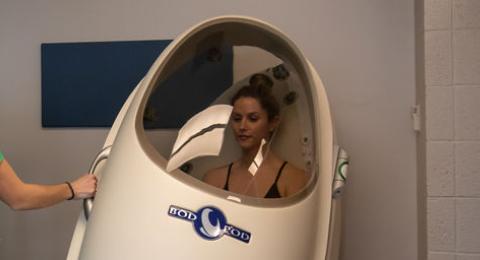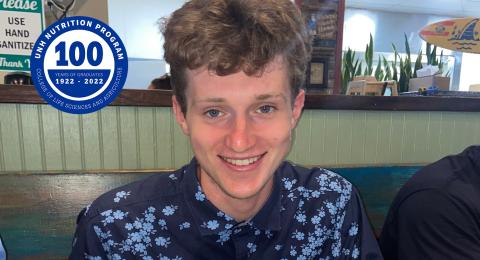Students who choose the Health and Wellness major at UNH desire to make a positive impact on individual and community health through informed dietary choices. This major blends the science of nutrition with a holistic approach to wellness, covering topics like nutrient metabolism, chronic disease prevention and healthy lifestyle promotion. As a Health and Wellness major, you will gain practical skills through internships, research, and community outreach. This major appeals to students passionate about nutrition, fitness and preventive healthcare and who enjoy motivating others to achieve their health goals and improve overall well-being.
At UNH, you have three curriculum options (Dietetics, Health and Wellness, Nutritional Sciences) for pursuing a bachelor's degree in nutrition. Students typically declare an option within the nutrition major no later than the second semester of their sophomore year.
Read more about our Health and Wellness option below.
What is health and wellness?
Health and wellness is a flexible program that provides students with a foundation in chemistry, anatomy, physiology and microbiology, while also including courses on stress, wellness and exercise science. Students gain real-world experience providing hands-on nutrition and health guidance. To help align their degree program with career goals, students are strongly encouraged to pursue a minor in areas such as kinesiology, business or health management, or a dual major in EcoGastronomy.
Why study health and wellness at UNH?
The health and wellness program at UNH prepares students for employment in a variety of wellness and health promotion settings including schools, fitness centers, nonprofit organizations and community agencies. Students have exceptional opportunities within a dynamic curriculum that includes specific courses in weight management, sports nutrition and the physiological impacts of stress, as well as applied research and community engagement. We also offer the UNH-in-Italy program, which allows students to experience the medieval city of Ascoli Piceno while studying diet, nutrition and food culture in another part of the world.
Potential careers
- Community agencies
- Nonprofit organizations
- Nutrition education
- Schools and fitness centers
- State and local government agencies
- Wellness promotion
Curriculum & Requirements
Nutrition is the study of how nutrients and food components function at molecular, cellular, and whole-body levels to impact human health and disease. Students are grounded in fundamental sciences as they develop nutrition-specific competencies in nutrition and health, foods, nutritional assessment, wellness, life cycle nutrition, and/or metabolic biochemistry.
The nutrition program prepares students for entry-level positions in health care, education, research, or the biotechnology industry, or entry into post-baccalaureate professional programs. Nutrition faculty have expertise in clinical nutrition, telehealth, epidemiology, and food science, as well as assessing risk factors of chronic disease risk (i.e. obesity, diabetes, cardiovascular, cognitive) in diverse populations (pediatric, young adult, older adult).
Students who complete the Health and Wellness option are prepared for jobs in agencies or businesses that have an emphasis on disease prevention and health promotion, including schools, employee wellness agencies, fitness centers, and non-profit or community organizations.
Sample Degree Plan
This sample degree plan serves as a general guide; students collaborate with their academic advisor to develop a personalized degree plan to meet their academic goals and program requirements.
| First Year | ||
|---|---|---|
| Fall | Credits | |
| NUTR 400 | Nutrition in Health and Well Being | 4 |
| NUTR 401 | Professional Perspectives on Nutrition | 1 |
| BMS 507 | Human Anatomy and Physiology I | 4 |
| SOC 400 or PSYC 401 | Introductory Sociology or Introduction to Psychology | 4 |
| ENGL 401 | First-Year Writing | 4 |
| Credits | 17 | |
| Spring | ||
| NUTR 476 | Nutritional Assessment | 4 |
| BMS 508 | Human Anatomy and Physiology II | 4 |
| HMP 401 | United States Health Care Systems | 4 |
| Discovery course | 4 | |
| Credits | 16 | |
| Second Year | ||
| Fall | ||
| CHEM 411 | Introductory Chemistry for Life Sciences | 4 |
| NUTR 403 | Culinary Arts Skills Development | 4 |
| Inquiry course | 4 | |
| Elective | 4 | |
| Credits | 16 | |
| Spring | ||
| NUTR 506 | Nutrition and Wellness | 4 |
| BMCB 501 | Biological Chemistry | 4 |
| Select one of the following: | 4 | |
BIOL 528 | Applied Biostatistics I | |
PSYC 402 | Statistics in Psychology | |
HMP 540 | Statistics for Health and Human Service Professionals | |
SOC 402 | Statistics | |
| Elective (WI) | 4 | |
| Credits | 16 | |
| Third Year | ||
| Fall | ||
| NUTR 546 | Nutrition in Exercise and Sports | 4 |
| NUTR 610 | Nutrition Education and Counseling | 4 |
| BMS 501 | Microbes in Human Disease | 4 |
| NUTR Elective or Discovery Course | 4 | |
| Credits | 16 | |
| Spring | ||
| NUTR 650 | Life Cycle Nutrition | 4 |
| NUTR Elective or Discovery Course | 4 | |
| Elective (any course) | 4 | |
| Elective (any course) | 4 | |
| Credits | 16 | |
| Fourth Year | ||
| Fall | ||
| NUTR 755 | Concepts and Controversies in Weight Management | 3 |
| NUTR 758 | Practicum in Nutrition and Wellness | 2 |
| Discovery Course | 4 | |
| Discovery Course or Elective | 4 | |
| 600-Level or 700-Level Elective or Elective (any course) | 3-4 | |
| Credits | 16-17 | |
| Spring | ||
| NUTR 720 | Community Nutrition | 4 |
| 600-level or 700-level Elective | 4 | |
| Discovery Course | 4 | |
| Elective (any course) | 3-4 | |
| Credits | 15-16 | |
| Total Credits | 128-130 | |
Degree Requirements
All Major, Option and Elective Requirements as indicated.
*Major GPA requirements as indicated.
Major Requirements
A minimum grade of C-minus or better must be earned in all NUTR courses required by the major.
| Code | Title | Credits |
|---|---|---|
| Foundation Courses | ||
| BMS 507 | Human Anatomy and Physiology I | 4 |
| BMS 508 | Human Anatomy and Physiology II | 4 |
| SOC 400 | Introductory Sociology | 4 |
| or PSYC 401 | Introduction to Psychology | |
| Select one statistics course from the following: | 4 | |
BIOL 528 | Applied Biostatistics I | |
HMP 540 | Statistics for Health and Human Service Professionals | |
PSYC 402 | Statistics in Psychology | |
SOC 402 | Statistics | |
| Science Core Courses | ||
| CHEM 411 | Introductory Chemistry for Life Sciences | 4 |
| or CHEM 403 & CHEM 404 | General Chemistry I and General Chemistry II | |
| BMS 501 | Microbes in Human Disease | 4 |
| BMCB 501 | Biological Chemistry | 4 |
| Nutrition Core Courses | ||
| NUTR 400 | Nutrition in Health and Well Being | 4 |
| NUTR 401 | Professional Perspectives on Nutrition | 1 |
| NUTR 476 | Nutritional Assessment | 4 |
| NUTR 650 | Life Cycle Nutrition | 4 |
| Nutrition and Wellness Option Courses | ||
| NUTR 403 | Culinary Arts Skills Development | 4 |
| NUTR 506 | Nutrition and Wellness | 4 |
| NUTR 546 | Nutrition in Exercise and Sports | 4 |
| NUTR 610 | Nutrition Education and Counseling | 4 |
| NUTR 720 | Community Nutrition | 4 |
| NUTR 755 | Concepts and Controversies in Weight Management | 3 |
| NUTR 758 | Practicum in Nutrition and Wellness | 2 |
| HMP 401 | United States Health Care Systems | 4 |
| Electives | ||
| Select NUTR elective | 4 | |
| Select 600-level or 700-level elective | 4-5 | |
Nutrition and Wellness Capstone Experience
One capstone experience, supervised and approved within the major, is required of all seniors. The capstone explores areas of interest based on the integration of prior learning. The capstone requirement for Wellness students is satisfied through the completion of NUTR 720 Community Nutrition or NUTR 755 Concepts and Controversies in Weight Management during their senior year.
Both NUTR 720 and NUTR 755 are required courses; one of these courses must be taken during the student's senior year to fulfill the university's capstone requirement.
Program Learning Outcomes
Students will be able to:
- Locate, interpret, evaluate and use professional literature to make ethical, evidence-based conclusions and decisions.
- Apply critical thinking skills.
- Deliver effective and professional oral and written communication.
- Demonstrate cultural humility, awareness of personal biases and an understanding of cultural difference they contribute to diversity, equity, and inclusion.
- Articulate aspects of nutrition and wellness for various populations across the lifespan.
- Discuss the impact of policies and guidelines on food and nutrition services.
Explore Program Details
Initial Admission to the major as a First-year or Transfer Student
Students entering the University as first-year or transfer students may declare Nutrition as part of the UNH admission process. First-year and transfer students who are admitted directly into Nutrition will be assigned an academic faculty advisor who will work with you throughout your course of study.
Change of Major Requirements for Existing UNH Students
We welcome UNH students who wish to declare the Nutrition Major or change their major from other degree programs. Applications are reviewed on a rolling basis; see below for entry requirements.
What Are the Steps to CHANGE My Major?
To facilitate a change of major into Nutrition, students should complete two steps*:
1) Submit an application requesting the transfer from another degree program. This online application is then reviewed by the program coordinator. Students are assigned an academic faculty advisor who will work with you throughout your course of study.
2) Request to change your major in Webcat. A tutorial for the process of changing a major is available.
ARE THERE REQUIREMENTS TO CHANGE MY MAJOR?
Current UNH students wishing to change their major and join the Nutrition Program must have:
- Earned a minimum of 12 UNH credits
- Completed OR be enrolled in NUTR 400 and NUTR 401
All students may transfer into one of the following:
- Nutrition: No Option
- Nutrition: Health & Wellness
- Nutrition: Nutritional Sciences
Students interested in transferring into the Nutrition: Dietetics Option, must also meet the following 3 requirements:
- Minimum GPA of 3.0
- Minimum earned grade in introductory nutrition (e.g. NUTR 400) = B
- Minimum earned grade in one semester of chemistry w/lab or anatomy/physiology with lab = C+
Students admitted to the Nutrition major at UNH are required to declare,and be formally admitted into one of the following options:
Nutrition majors designate an option once they have successfully completed: 1) NUTR 400, 2) NUTR 401, & 3) BMS 507 or CHEM 403 (CHEM 411 for Wellness). The Fall and Spring semester deadlines are September 15th and February 15th, respectively.
CHANAS is a wonderful venue for those interested in undergraduate and graduate research projects. Each semester UNH students work as research assistants for the project and, in the process, gain valuable research and clinical skills.
Updated sheet coming soon.
Advising is available for UNH students, alumni, and post baccalaureates pursuing health professional careers.
The Pre-Health Advising Office provides support throughout the process of preparing for health professions school from advising on the courses they should take to helping navigate through the complex steps of the application process.
Register with Pre-Professional Health Office
Students interested in the Nutrition: Health and Wellness major may also be interested in the following advanced degrees at UNH. Students in the program also have the opportunity to participate in the UNH accelerated master’s program.
Agricultural Sciences M.S.
Agricultural Sciences Ph.D.
Nutrition M.S.
Nutrition and Dietetics M.S.
Nutritional Sciences M.S.
Nutritional Sciences Ph.D.

















